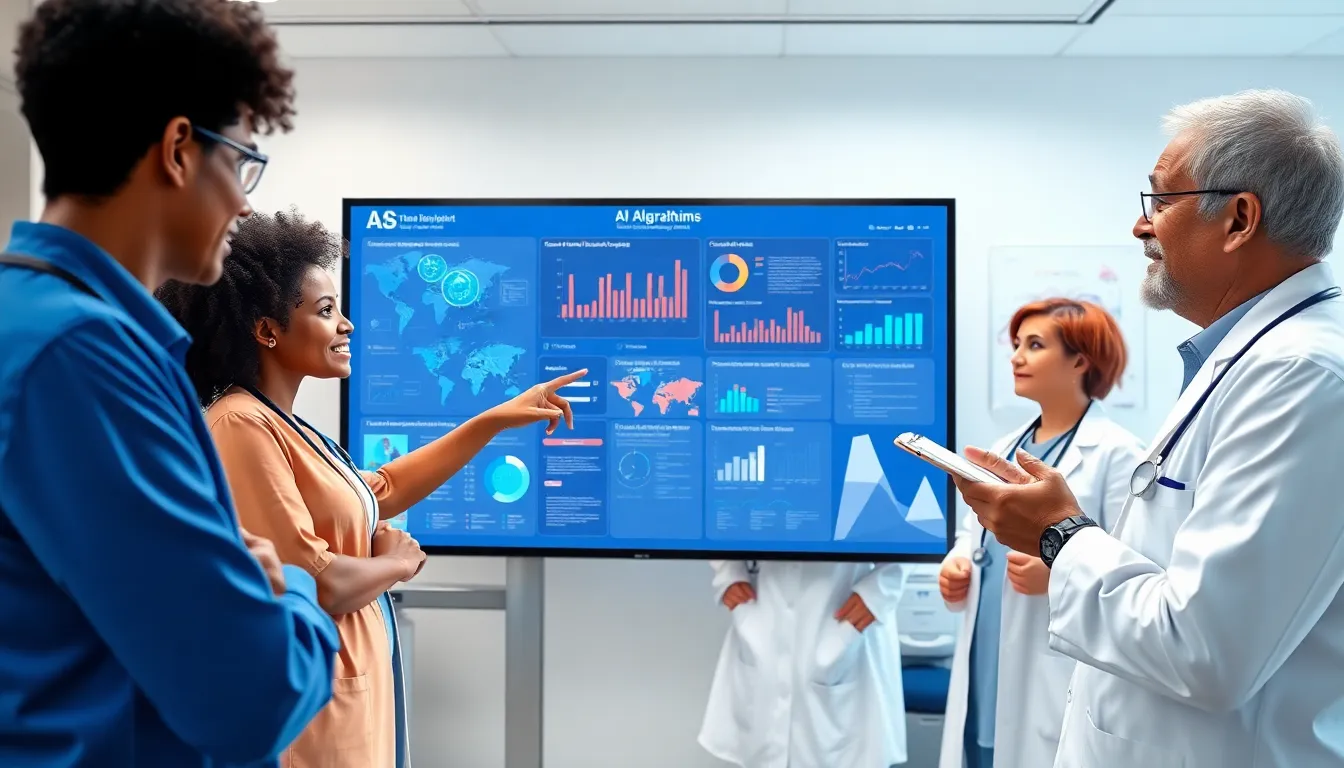In a world where deadlines loom like storm clouds and team dynamics can rival a soap opera, AI project management emerges as the superhero we didn’t know we needed. Imagine a trusty sidekick that never sleeps, never forgets, and is always ready to crunch numbers while you sip your coffee. With AI at the helm, project managers can finally trade their stress for success.
Table of Contents
ToggleOverview of AI Project Management
AI project management integrates artificial intelligence technologies into the planning and execution of projects, enhancing efficiency and enabling smarter decision-making processes.
Definition of AI Project Management
AI project management involves using machine learning algorithms and automation tools to streamline various project management tasks. This includes scheduling, resource allocation, and risk assessment. By analyzing large datasets, AI tools provide insights that inform project goals and strategies. These systems can predict potential bottlenecks, allowing managers to take preemptive action. Overall, AI enhances traditional project management methodologies by adding a layer of data-driven analysis.
Importance in Modern Workplaces
The importance of AI project management in modern workplaces cannot be overstated. Organizations benefit from increased productivity as tasks become more automated. With reduced manual workloads, team members focus on higher-level strategic initiatives. AI aids in predictive analytics, helping businesses anticipate challenges before they arise. Companies can achieve better resource utilization through AI’s timely data analysis. Additionally, enhanced communication tools foster collaboration among diverse teams, leading to more cohesive project outcomes. Overall, integrating AI into project management transforms organizational workflows and drives success.
Key Features of AI Project Management Tools

AI project management tools come equipped with several key features that enhance efficiency and effectiveness in project execution. Understanding these features aids project managers in leveraging AI’s full potential.
Automation of Tasks
Automation of tasks streamlines workflows and reduces manual effort. Routine functions like scheduling, updating status reports, and tracking progress happen automatically. AI tools identify repetitive processes, allowing teams to focus on strategic planning. Automation minimizes the risk of human error, ensuring greater accuracy in task completion. With this capability, project managers can allocate more time to critical decision-making and team collaboration.
Data-Driven Decision Making
Data-driven decision making relies on comprehensive analysis of large datasets. AI tools extract insights from project metrics, enabling informed strategies. Predictive analytics highlight trends and potential obstacles, facilitating proactive management approaches. Such insights lead to better resource allocation and risk assessment, helping to avoid delays. By equipping teams with accurate forecasts, AI enhances overall project outcomes and supports alignment with organizational goals.
Benefits of Implementing AI in Project Management
AI integration in project management provides significant advantages. Companies experience enhanced outcomes through increased efficiency and improved collaboration among team members.
Increased Efficiency
AI automates repetitive tasks, allowing project managers to focus on strategic initiatives. It analyzes project-related data rapidly, identifying potential risks and areas of improvement. Projects that incorporate AI tools often meet deadlines more effectively due to better scheduling practices. With predictive analytics, teams can anticipate challenges before they arise. AI-driven systems optimize resource allocation, minimizing waste and maximizing output. Consequently, organizations consistently achieve higher project success rates as they leverage AI for precise decision-making.
Enhanced Collaboration
AI enhances communication between team members by providing real-time updates on project status. Tools that utilize AI streamline feedback processes, ensuring everyone remains aligned with project goals. Teams can collaborate more effectively as AI tools centralize information, making it easily accessible. By offering insights into team dynamics, AI helps identify strengths and weaknesses among members, fostering a supportive environment. Improved collaboration leads to more innovative solutions and increased engagement among team members. Ultimately, organizations witness better teamwork and alignment with business objectives through effective AI integration.
Challenges and Considerations
AI project management presents challenges that require careful navigation. These hurdles, particularly around data privacy and system integration, impact the successful implementation of AI technologies.
Data Privacy Concerns
Data privacy remains a significant challenge in AI project management. Organizations often handle sensitive information, raising concerns about unauthorized access and data breaches. Compliance with regulations such as GDPR mandates safeguards against data misuse. Technologies such as encryption and anonymization help mitigate risks. Educating project teams about data handling practices further protects user data. Regular audits and updates to AI systems ensure they adhere to evolving privacy standards.
Integration with Existing Systems
Integrating AI tools with existing systems poses technical challenges. Compatibility issues often arise between legacy systems and modern AI platforms. Project teams face difficulties aligning workflows and processes. Evaluating and selecting tools that complement current technologies promotes seamless integration. Key stakeholders must collaborate to create a unified strategy. Ensuring robust training for team members on new systems enhances adaptation during the transition phase.
Future Trends in AI Project Management
AI technologies continue to evolve, shaping the future of project management. Emerging tools integrate advanced machine learning, enhancing automation capabilities. Organizations will adopt these tools to streamline workflows further. Increased sophistication in natural language processing enables AI systems to translate project requirements into actionable tasks. Predictive analytics will become more precise, allowing project managers to foresee challenges before they arise.
Insights gained from real-time data analysis will offer a competitive edge in project execution. Teams will leverage AI-driven insights for better decision-making and alignment with business goals. As these technologies advance, real-time adjustments to project strategies will emerge, fostering adaptability and resilience.
Evolution of AI Technologies
AI technologies are progressing rapidly, transforming project management landscapes. Automation tools increasingly manage tasks like scheduling and resource allocation. Predictive analytics are growing more adept at foreseeing potential risks and bottlenecks. These advancements enable seamless project execution while enhancing team collaboration.
AI’s evolution emphasizes user-friendliness, allowing teams to adapt quickly. Integration with collaboration platforms will enhance communication among members. Team leaders will find emerging AI tools increasingly vital for optimizing workflows. By harnessing these capabilities, organizations can expect improved efficiency and project outcomes.
Predictions for Project Management Practices
Project management practices are set for substantial shifts due to AI integration. Enhanced decision-making processes will emerge, driven by data-derived insights. Teams will focus on strategic initiatives, leaving routine tasks to automated systems. The importance of real-time feedback will rise, allowing teams to pivot based on evolving project needs.
As AI becomes integral to workflows, collaboration tools will evolve to support remote and hybrid work environments. Project managers will prioritize transparency and communication to foster stronger alignment among team members. Successful organizations will embrace these shifts, positioning themselves for increased innovation and improved project success rates.
Conclusion
AI project management is reshaping how teams approach their work. By automating routine tasks and providing valuable insights from data analysis, AI empowers project managers to focus on strategic initiatives. This shift not only enhances productivity but also fosters better collaboration among team members.
As organizations continue to integrate AI technologies, they can expect improved project outcomes and more efficient workflows. However, addressing challenges like data privacy and system integration remains crucial for success. The future of project management will likely see even greater advancements in AI capabilities, driving innovation and adaptability in an ever-evolving landscape. Embracing these changes positions teams for success in achieving their goals.





